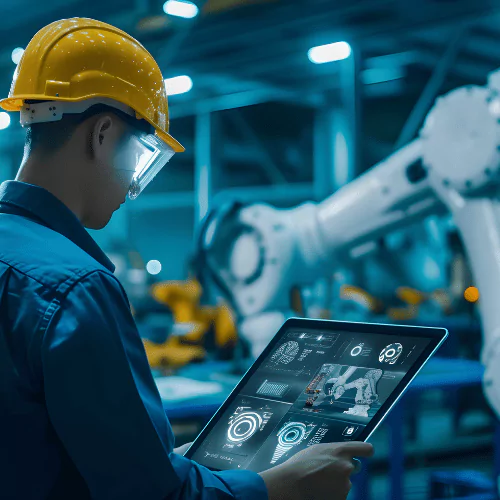- Manufacturing faces challenges in maintaining high-quality standards due to human error and the limitations of traditional inspection methods.
- Advanced AI algorithms enable real-time, highly accurate defect detection, automating quality control processes and reducing reliance on manual inspection.
- This AI-driven approach results in fewer production errors, reduced waste, and lower costs, setting new benchmarks for quality control and operational efficiency in manufacturing.
Background
For a leading German automotive component manufacturer, the inspection of critical components such as bearings and gears, which is both time-consuming and prone to errors, posed a significant challenge.
To tackle the client’s inspection woes, Tata Elxsi’s AI automates defect detection, making it more accurate, swift along with efficient operations.

The AI Solution
Image Analysis
Tata Elxsi’s AI solution leverages advanced image analysis techniques to meticulously inspect components such as bearings and gears. By utilizing state-of-the-art algorithms, the system captures high-resolution images of each component, identifying even the smallest defects that might be missed by the human eye.
Automated Insights
The solution integrates powerful AI models like YOLO (You Only Look Once) and EfficientDet for real-time object detection and defect analysis. These models process the captured images swiftly, providing automated insights into the quality and integrity of each component. The AI can distinguish between different types of defects and assess their severity, ensuring that only components meeting the highest standards proceed further in the production line.
Custom Dashboard
A custom dashboard designed by Tata Elxsi presents these insights in a user-friendly interface. The dashboard allows quality control teams to monitor inspection results in real-time, review detailed reports, and track historical data for trend analysis. This centralized view simplifies decision-making and enables quick responses to any quality issues.
Tech Stack
- AI architecture: YOLO, EfficientDet
- Programming Languages: Python, JavaScript/ React
- Frameworks and Libraries: TensorFlow/ PyTorch
- DevOps Tools: Docker, Kubernetes
- Version Control: Git/ GitHub
Impact and Results
- This AI-driven solution has revolutionised and lightened the workload of domain experts by automating the initial defect detection process.
- Helped cut down analysis time from weeks / months to mere minutes.
- By incorporating automated defect analysis, the project significantly reduced time and effort compared to manual methods.
The project received high customer satisfaction scores, with CSAT ratings of 4.66 and 4.51 out of 5 for the first and second phases, respectively.